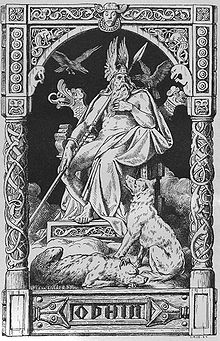Geri and Freki
Geri and Freki (old north: "the greedy" and "the voracious") are two wolves in Norse mythology who, like the ravens Hugin and Munin , accompany the god Odin .
According to the Edda, Geri and Freki in Valhalla consume all the food that is served to Odin while he only eats mead .
etymology
The name Geri means "the greedy" or "the predatory, the voracious". The name Geri can be traced back to the Proto-European adjective "geraz". There is evidence of Burgundian “girs”, Old Norse “gerr” and Old High German “ger” or “giri”, all with the meaning “greedy”. The name “Freki” can be traced back to the Proto-Germanic adjective “frekaz”, in Gothic faihu-friks with the meaning “covetous, lustful, greedy”, Old Norse frekr with the meaning “greedy”, Old English frec with the meaning “covetous, greedy, voracious, bold "and old high German freh with the meaning" greedy ". John Lindow interprets the two Old Norse names as nominalized adjectives. Bruce Lincoln traces “Geri” back to the Proto-Indo-European strain “gher”, which is also the basis for “Garmr”. The dog Garm guards the entrance to the underworld and plays an important role in the Ragnarök .
Individual evidence
- ↑ Simek (2006, pp. 90 and 106); Lindow (2001, p. 120; 139).
- ↑ Orel (2003, pp. 113 and 132).
- ^ Lindow (2001, pp. 120 and 139).
- ^ Lincoln (1991, p. 99).
literature
- Rudolf Simek : Lexicon of Germanic Mythology (= Kröner's pocket edition . Volume 368). 3rd, completely revised edition. Kröner, Stuttgart 2006, ISBN 3-520-36803-X .
- John Lindow: Norse Mythology: A Guide to the Gods, Heroes, Rituals, and Beliefs. Oxford University Press, 2001, ISBN 0-19-515382-0 .
- Vladimir Orel: A Handbook of Germanic Etymology. Leiden 2003, ISBN 90-04-12875-1 .
- Bruce Lincoln: Death, War, and Sacrifice: Studies in Ideology and Practice. University of Chicago Press, 2001, ISBN 0-226-48199-9 .
